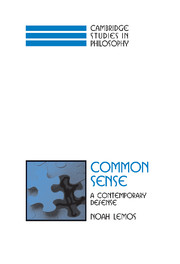Book contents
- Frontmatter
- Contents
- Acknowledgments
- Preface
- 1 The Common Sense Tradition
- 2 Common Sense and Reliability I
- 3 Common Sense and Reliability II
- 4 Reid, Reliability, and Reid's Wrong Turn
- 5 Moore, Skepticism, and the External World
- 6 Chisholm, Particularism, and Methodism
- 7 Common Sense and A Priori Epistemology
- 8 Particularism, Ethical Skepticism, and Moral Philosophy
- Conclusion
- Selected Bibliography
- Index
4 - Reid, Reliability, and Reid's Wrong Turn
Published online by Cambridge University Press: 22 August 2009
- Frontmatter
- Contents
- Acknowledgments
- Preface
- 1 The Common Sense Tradition
- 2 Common Sense and Reliability I
- 3 Common Sense and Reliability II
- 4 Reid, Reliability, and Reid's Wrong Turn
- 5 Moore, Skepticism, and the External World
- 6 Chisholm, Particularism, and Methodism
- 7 Common Sense and A Priori Epistemology
- 8 Particularism, Ethical Skepticism, and Moral Philosophy
- Conclusion
- Selected Bibliography
- Index
Summary
In this chapter, I consider the views of Thomas Reid concerning our knowledge of the reliability of our faculties. Reid holds that it is a “first principle” that perception and memory and, indeed, all of our natural cognitive faculties are reliable. Yet, in several places, he seems to endorse ways of supporting the reliability of our faculties that seem to be epistemically circular. In the first section, I shall examine some of these passages. In the second section, I shall consider a brief yet important criticism Reid makes of Descartes. Reid argues that Descartes's argument that his faculties are reliable is question-begging. If Reid's criticism of Descartes is sound, then it seems that any reasoning for the reliability of our faculties must also be question-begging. I will argue, however, that Reid's charge that Descartes begs the question rests on a mistaken view of what knowledge requires. It also seems to be a view that is inconsistent with positions that Reid endorses elsewhere. Reid's endorsement of this mistaken view seems to be a lapse on his part.
REID ON OUR KNOWLEDGE OF THE RELIABILITY OF OUR FACULTIES
Kant is among the most prominent critics of the common sense tradition, at least as it is represented by Reid. In Kant's view, it is an appeal to the opinion of the multitude, of which a real philosopher ought to be ashamed. In one blistering passage, Kant writes:
It is indeed a great gift of God to possess right or (as they now call it) plain common sense.[…]
- Type
- Chapter
- Information
- Common SenseA Contemporary Defense, pp. 67 - 84Publisher: Cambridge University PressPrint publication year: 2004



